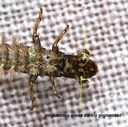Hydropsyche
Hydropsyche
Classification
- Phylum: Arthropoda
- Subphylum: Hexapoda
- Class: Insecta
- Order: Trichoptera
- Suborder: Annulipalpia
- Superfamily: Hydropsychoidea
- Family: Hydropsychidae
- Subfamily: Hydropsychinae
- Genus: Hydropsyche
Pronunciation
How to pronounce Hydropsyche: //haɪˈdrɒpsɪki//
These audio files are automatically generated. While they are not always 100% accurate, they are a good starting point.
Images






Summary
Hydropsyche is a genus of net-spinning caddisflies with around 260 species globally, known for their larvae that build nets in streams for filter feeding.
Physical Characteristics
Adult body length 10-15 mm; head and body with patches of short hair; forewing light to medium brown or grayish with speckling and mottling; anal angle of forewing sharp-angled. Larvae have a distinctive head pattern, a dorsal plate on each thoracic segment, and rows of bushy gills on the abdomen.
Identification Tips
Look for distinctive forewing patterns and colors; adults are often found on vegetation near streams.
Habitat
Larvae inhabit fast-moving portions of streams and rivers; adults are usually found on nearby vegetation.
Distribution
Worldwide distribution with many species in various habitats, especially in streams.
Diet
Larvae are filter feeders, primarily consuming algae, detritus, and organic particles caught in their nets.
Life Cycle
The life cycle includes both aquatic larvae and terrestrial adults, with larvae building nets to capture food.
Reproduction
Specific reproductive habits are not detailed, but like many caddisflies, they likely involve layings eggs in or near water.
Predators
Specific predators not detailed, but likely include fish and other aquatic predators that prey on larvae.
Ecosystem Role
Larvae play a role in aquatic ecosystems as filter feeders, contributing to nutrient cycling.
Evolution
Hydropsyche is one of the genera within the diverse Trichoptera order, showcasing evolutionary adaptations related to net-spinning behavior.
Misconceptions
Often confused with other caddisflies due to similar appearances, but their net-building behavior is distinctive.
Tags
- Hydropsyche
- caddisflies
- Trichoptera
- freshwater insects